仁爱版八年级下册Unit 6 Topic 1 Section D
- 格式:ppt
- 大小:3.52 MB
- 文档页数:22
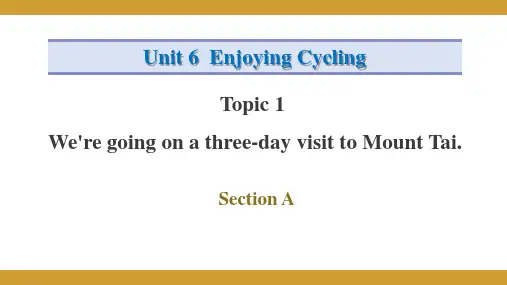
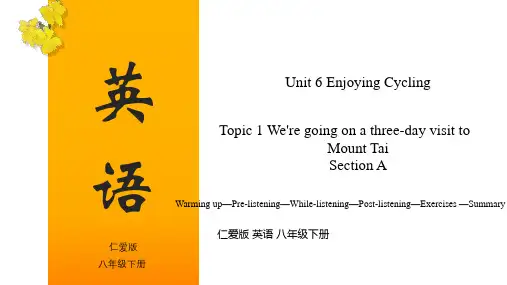
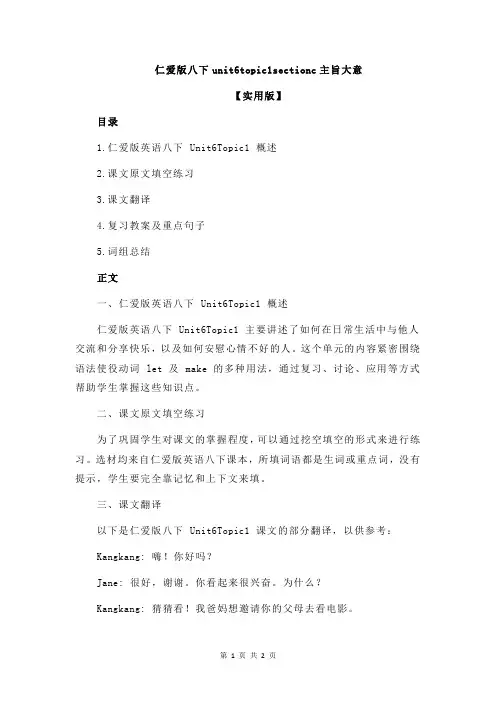
仁爱版八下unit6topic1sectionc主旨大意
【实用版】
目录
1.仁爱版英语八下 Unit6Topic1 概述
2.课文原文填空练习
3.课文翻译
4.复习教案及重点句子
5.词组总结
正文
一、仁爱版英语八下 Unit6Topic1 概述
仁爱版英语八下 Unit6Topic1 主要讲述了如何在日常生活中与他人交流和分享快乐,以及如何安慰心情不好的人。
这个单元的内容紧密围绕语法使役动词 let 及 make 的多种用法,通过复习、讨论、应用等方式帮助学生掌握这些知识点。
二、课文原文填空练习
为了巩固学生对课文的掌握程度,可以通过挖空填空的形式来进行练习。
选材均来自仁爱版英语八下课本,所填词语都是生词或重点词,没有提示,学生要完全靠记忆和上下文来填。
三、课文翻译
以下是仁爱版八下 Unit6Topic1 课文的部分翻译,以供参考:
Kangkang: 嗨!你好吗?
Jane: 很好,谢谢。
你看起来很兴奋。
为什么?
Kangkang: 猜猜看!我爸妈想邀请你的父母去看电影。
Maria: 真的?他们打算看什么电影?
Kangkang: 他们想看《速度与激情》。
四、复习教案及重点句子
仁爱英语八下 Unit5Topic3 复习教案主要围绕语法使役动词 let 及 make 的多种用法展开讨论。
教学设计包括说教材、复习课、讨论课和应用课等形式。
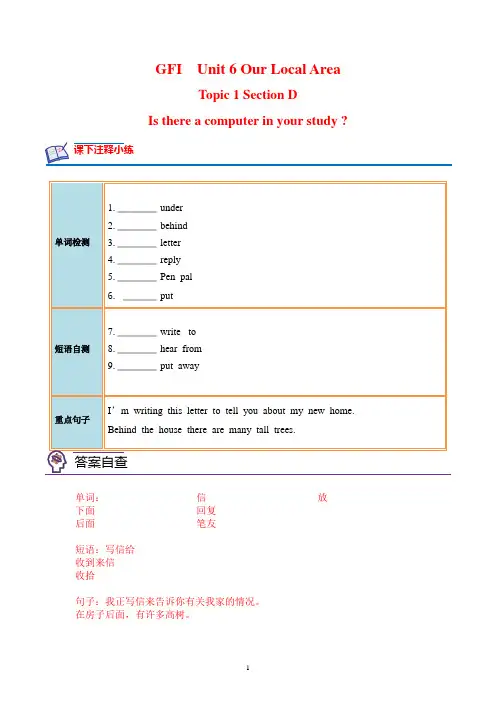
GFI Unit 6 Our Local AreaTopic 1 Section DIs there a computer in your study ?单词检测1. _______ under2. _______ behind3. _______ letter4. _______ reply5. _______ Pen pal6. ______ put 短语自测7. _______ write to8. _______ hear from 9. _______ put away重点句子I ’m writing this letter to tell you about my new home. Behind the house there are many tall trees.单词: 下面 后面 信 回复 笔友 放短语:写信给 收到来信 收拾句子:我正写信来告诉你有关我家的情况。
在房子后面,有许多高树。
答案自查课下注释小练课后培优练级练培优第一阶——基础过关练一、根据汉语提示填空1.What ________ (种类) of vegetables do you like best?2.You should ________(放) away your school things.3.His home is in the ________(中央) of the city.4.The house has three ________ (窗子).5.There is a football ________(在……的后面) the door.二、用括号中所给单词的适当形式填空6.My sister and I live on the ________ (two) floor.7.There are many ________(key) in the bag.8.Tom ________(write) his girlfriend a letter every week.9.There are two ________(shelf) in the study.10.How many ________(apple) trees are there in the garden?三、单项选择11.— Do you often ________ your friends?— No, seldom.A.write a letter B.write to C.writes to D.writing to 12.There is big blackboard _____ the classroom. All the students are listening to the teacher ________ the blackboard.A.in front of; in front of B.in the front of; in the front ofC.in the front of; in front of D.in front of; in the front of13.— ________ apple juice ________ there in the glass?— Only a little.A.How many; are B.How much; is C.How many; is D.How much; are 14.—Where’s your living room?—It’s ________ our dining room.A.next to B.in C.at D.on15.The little boy can play ________ basketball very well and he can also play ________ guitar well.A.the; the B./; / C.the; / D./; the16.There ________ 30 boys and 15 girls in their class.A.be B.is C.are D.have17.— You must ______ those trees and flowers in the garden.— OK, Miss Gao.A.look for B.look after C.look like D.look at 18.—Where are my keys, Dad? I can’t find them.—Look! They’re under the table. You must _____.A.put it away B.put away it C.put them away D.put away them 19.— ________ in the garden?— There is an old tree and some beautiful flowers.A.What’s B.Where’s C.How’s D.Which is 20.There are ________ trees in the garden. But there aren’t ________ flowers there. A.some; some B.some; anyC.any; some D.any; any四、完成句子21.Our class has fifty students. (改为同义句)________ ________ fifty students in our class.22.There is a table in the dining room. (改为一般问句并进行否定回答)________ ________ a table in the dining room?No, ________ ________.23.There aren’t any trees in our school. (改为肯定句)There ________ ________ trees in our school.24.There are two bottles of water in the kitchen. (对画线部分提问)________ ________ bottles of water are there in the kitchen?25.我每周给我的笔友写信。
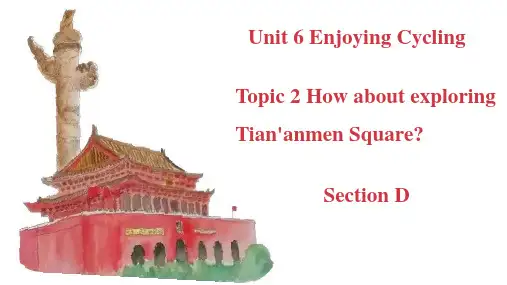
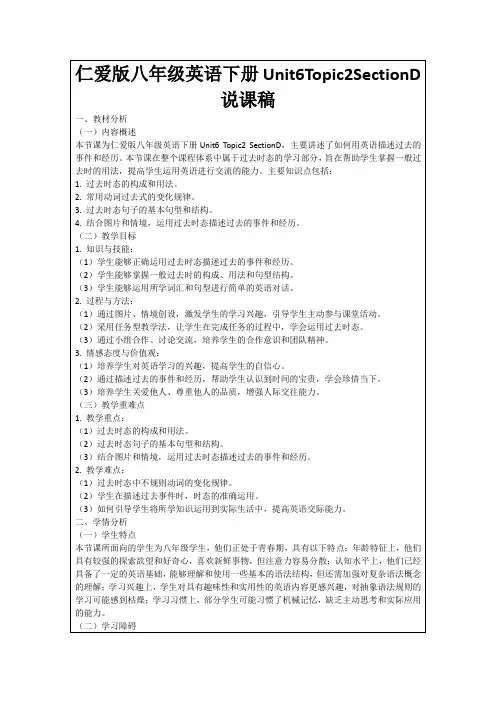
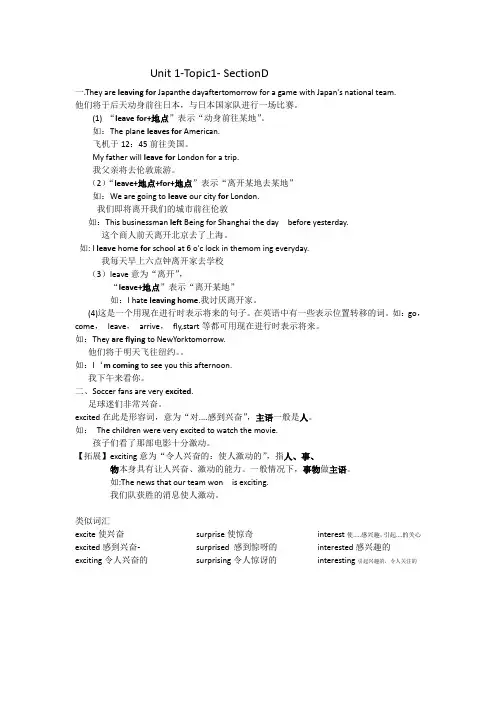
Unit 1-Topic1- SectionD一.They are leaving for Japanthe dayaftertomorrow for a game with Japan's national team.他们将于后天动身前往日本,与日本国家队进行一场比赛。
(1) “leave for+地点”表示“动身前往某地”。
如:The plane leaves for American.飞机于12:45前往美国。
My father will leave for London for a trip.我父亲将去伦敦旅游。
(2)“leave+地点+for+地点”表示“离开某地去某地”如:We are going to leave our city for London.我们即将离开我们的城市前往伦敦如:This businessman left Being for Shanghai the day before yesterday.这个商人前天离开北京去了上海。
如: I leave home for school at 6 o'c lock in themom ing everyday.我每天早上六点钟离开家去学校(3)leave意为“离开”,“leave+地点”表示“离开某地”如:I hate leaving home.我讨厌离开家。
(4)这是一个用现在进行时表示将来的句子。
在英语中有一些表示位置转移的词。
如:go,come,leave,arrive,fly,start等都可用现在进行时表示将来。
如:They are flying to NewYorktomorrow.他们将于明天飞往纽约。
如:I‘m coming to see you this afternoon.我下午来看你。
二、Soccer fans are very excited.足球迷们非常兴奋。
excited在此是形容词,意为“对....感到兴奋”,主语一般是人。
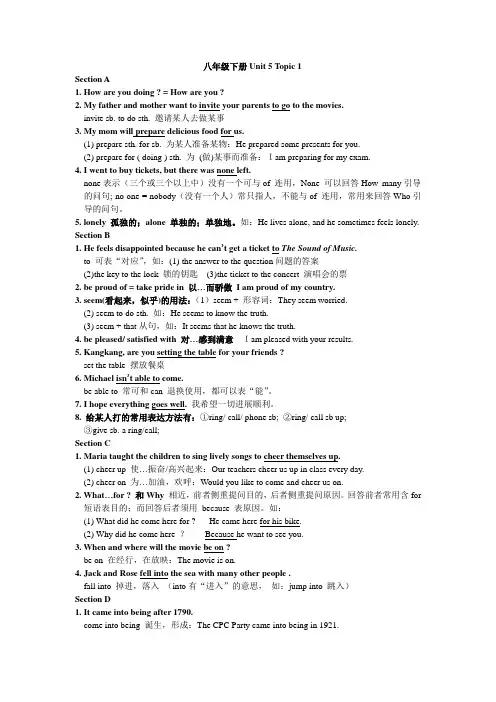
八年级下册Unit 5 Topic 1Section A1. How are you doing ? = How are you ?2. My father and mother want to invite your parents to go to the movies.invite sb. to do sth. 邀请某人去做某事3. My mom will prepare delicious food for us.(1) prepare sth. for sb. 为某人准备某物:He prepared some presents for you.(2) prepare for ( doing ) sth. 为(做)某事而准备:Iam preparing for my exam.4. I went to buy tickets, but there was none left.none表示(三个或三个以上中)没有一个可与of 连用,None 可以回答How many引导的问句; no one = nobody(没有一个人)常只指人,不能与of 连用,常用来回答Who引导的问句。
5. lonely 孤独的;alone 单独的;单独地。
如:He lives alone, and he sometimes feels lonely. Section B1. He feels disappointed because he can’t get a ticket to The Sound of Music.to 可表“对应”,如:(1) the answer to the question问题的答案(2)the key to the lock 锁的钥匙(3)the ticket to the concert 演唱会的票2. be proud of = take pride in 以…而骄傲I am proud of my country.3. seem(看起来,似乎)的用法:(1)seem + 形容词:They seem worried.(2) seem to do sth. 如:He seems to know the truth.(3) seem + that从句,如:It seems that he knows the truth.4. be pleased/ satisfied with 对…感到满意Iam pleased with your results.5. Kangkang, are you setting the table for your friends ?set the table 摆放餐桌6. Michael isn’t able to come.be able to 常可和can 退换使用,都可以表“能”。
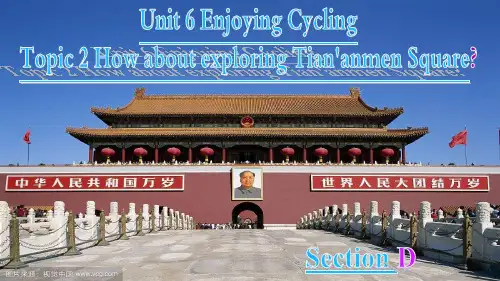
![[原创归纳]仁爱版八年级下英语语法归纳](https://uimg.taocdn.com/8d95b6f58ad63186bceb19e8b8f67c1cfad6eed0.webp)
初二年下册英语语法归纳(仁爱版)【2】Unit5Topic1SectionA2.1nvitesb./todosth.邀请或人做某事;Invitesb.\+地点邀请或人去某地.3.Prepare...for...=getreadyfor...为预备.4.Saythankstosb.向或人道谢. SectionBl.Aticketto\for的票.2.Beabletodosth...=can有才能做某事.但是can一般用于如今时和曩昔时而beableto可以用于任何时态・3................................................................................ Ringsb.up打德律风给或人.4.Beproudof以自满.5.Bepleasedwith.对..满足.SectionC1.Careabout关怀;Care+从句省略about2.Getmarriedtosb.=marrysb.与或人娶亲.3.关于消费:Sth.Costsb.+钱;Sb.spend+时\钱in.onsth.'doingsth.Ittakesb\时todosth.;Sb.pay钱forsth.4.Beon上映.5.Cheerup使振作.6.What...for=why.(白话)SectionDeintobeing形成.2.Befullof=befilledwith充满.3.......................... Endwith以结尾.4.Makepeacewithsb.与或人媾和.Unit5Topic2SectionA1.Seem/todosth.似乎做某事.\adj作表语.;Itseemthat+从句.2.Havetalkwithsb.与或人攀谈.3.Bestrictwithsb.对或人严厉.SectionBl.Failtodosth.掉败,做不到某事.2.Atone'sage.在年纪时3.Attheageof.在岁时4.Makesb.todosth让或人做某事.As+adj\adv原级+as与一样;Notas\so+adj\adv原级+as与不一样.6.Be\getusedtodoingsth.习惯做某事;Usedtodosth.曩昔习惯做某事.SectionC 1.Beafraidofdoingsth.畏惧做某事.2.Dealwith=dowith.处理.4.Refusetodosth.谢绝做某事.5.Eventhough=even讦即使.6.Not...anylonger=nolonger不再.7.Fallasleep入睡.8.Inone'steens在或人的时期.9.Give.ahand=dosb.afavor=helpsb.给或人关心.10.比较级+and+比较级越来越程度递增.The+比较级...The+比较级…越越两种情形同时变.11.原因状语从句.Unit5Topic3SectionA1.Have\has+动词曩昔分词.如今完成时.2.Can'tbe确定不是,否认推想.3.Mustbe必定是,确定推想.4.Maybe可能是,猜测推想.5.Attheendof...在…的最后;Intheendof...最后.6・That\it's+adj+foi\tobdosth.7.1nsteadof+n.\v\代…代替8.Taketurnstodosth.=taketurnsatdoingsth.=dobyturns轮流做某事.SectionB 1......................................... B ebad\good for...对有害\益.2661alongwithsb\sth与相处得好.3.Justas似乎.4.Smileat\tosb.\sth.微笑面临或人.某事;Smile,微笑(没有声音);Laugh,大笑(有声音),Laughatsb.取笑或人.5.Giveasurprisetosb=givesbasurprise给或人一个惊喜.6.0ntheone'swayto...在或人去的路上;后接副词则省去to.SectionC1.世界上举世无双的事物前加定冠词the2.Hadbetterdosth\notdosth.最好做某事.不要做某事.SectionD1.Getbacktosth持续回到某事上.Unit6topic1l.Goonavisitto...去旅游.参不雅.2.1t'shatetosay这很难说.3.Decidetodosth决议做某事.4.Make(take)adecide下决议.5.Decideon\upon决议.SectionBl.Ticketat+钱+for...票的价钱.2・具体某一天的早・中・晚上,前用介词on・SectionCeupwith…想出.2.Lookforwardtosth\doingsth.愿望某事.愿望做某事.3.Hearfromsb收到或人来信.SectionD动词不定式1•根本情势:to+动词本相(确定情势)Notto+动词本相(否认情势)2・特点:没有人称和数的变化・3・常用句型:It's+adj+todosth.Too+adj+todosth・4・动词不定式可以跟疑问词连用・E.g:Idon'tknowwhattodo\howtodoit.Unit6topic2SectionA1.Plantodosth.筹划做某事.2.Makeaplanto...\makeplansto...制订的筹戈U.SectionB1.Atthefoot of...在的脚下.2.Marksthebeginningof标志着的开端.3.Bytheway.趁便问一下.4.Onbothsides of...在的两旁.5.“几个半”表示办法:基数词+and+ahalf+n.=基数词+n.+and+ahalf.E.g.oneandahalfyears=oneyearandahalf.一年半.6.表示方位的介词差别Inthe+方位名词+of・・・指某一规模内的地区.(中国,北京)tothe+方位名词+of・・・指互不交界互不管辖的地区.(中国,日本)onthe+方位名词+of・互相交界但互不管辖的地区.(中国,尼泊尔)SectionCl.Outofsight看不见(视线之外)2.Noticesbdo\doingsth.留意或人(正在做)做某事.3.Can'thelpdoing不由得.4.Arrivein+大地点;Arriveon+小地点SectionD1.Havefundoingsth.从做某事中得到乐趣.2.时光状语从句特点:常用一般如今时表示未来时;主句未来时,从句用一般如今时;时态一致——主句与从句同时为曩昔时.引诱时光状语从属连词:When(当的时刻,强调统一时光或一前一后)while(当的时刻,带有延续性)before(在之前)after(在之后)as(当的时刻)until.till(直至U为止)assoonas (一就)Unit6topic3SectionAl.Beafraidofdoingsth.\that+从句.畏惧做某事.SectionB1.Warnsbtodosth\nottodosth.警告.提示或人做某事.不做某事.2.Warnsbaboutsth提示或人某事.SectionC1.Goondoingsth持续做某事(统一件);Goontodosth.持续做某事(另一件)2.Make\letsbdosth使或人做某事.3.使役动词makelethave等,一律省去to,直接加动词本相.SectionD前提状语从句:1•由if,uness(除非)引诱的状语从句叫前提状语从句.2.特点:常用一般如今时表示未来时;主句未来时,从句用一般如今时.主句含一般未来时.祈使句•情态动词,从句用一般如今时.Unit7topic1SectionA1.Turnto=asksb.forhelp向或人乞助.2.Knowabout懂得.3.Chatwithsb.ontheinternet和或人在网上谈天.4.Tryone'sbest\doone'sbest尽或人最大尽力.5./Thinkover细心斟酌\Thinkof斟酌,对有意见.此时可与thinkabout交换.6.Imaginedoingsth.想象做某事.SectionB1.Haveasweettooth爱吃甜食.2.What'smore并且.SectionCl.Inorderto do...为了做;Inorderthat+从句引诱目标状语从句.2.Keepupsth.保持做……3.Seed+间接宾语(sb.)+直接宾语(sth.)双宾构造句.4.Givesb.bes twishesto.或人最好的祝贺给...What引诱的感慨句,强调名词,单数可数名词前带冠词a\an・有时主语和谓语可以省去.SectionDetrue系表构造.成为实际.2.Invitation邀请函.3•宾语从句IUnit7topic2SectionA1.Beglad+adj.+that从句.愉快……2.Cutsth.切某物;Cutup切碎;Cutsth.Into...切成;Cutdown砍到.3.Addto添加;Add...to…将加在…;Addup加起来;Addupto总计为4.表次序词:(含序数词)First起首.Second其次next在此then然后.Afterthat然后finally最后. SectionBl.Spreadsthonsth.往上面抹2.Practicemakesperfect熟能生巧. SectionCl.Startwith以……开端.2.Eatsth.up吃完,吃光.3.Finishdoingsth.完成做某事.4.Pickup捡起,捡起.SectionD1.Atthesametime同时.2•宾语从句IIf\whether引诱的宾语从句,不能省略引诱词可以与whether通用,但在whether ・・・or not的情形下则不能.Unit7topic3SectionAl.Forsale待售;0nsale出售.2.Besatisfiedwith...对满足.3.Wishsb.sth.祝贺或人;Wishtodosth=Hopetodosth.愿望做某事.Wishsb.todosth.愿望或人做某事.4.Hope斟酌可能性的“愿望”;Wish不斟酌是否可能.SectionBl.Ordersbtodosth敕令或人做或人;Orderthat+从句.SectionCl.Beworthdoingsth.值得做某事.SectionD1.1t'ssaid...据说后接that引诱从句.2.1nshort总之.3.Notonly.butalso.不但..并且..衔接的并列成分必须雷同,当衔接两个名词或代词为主语.谓语动词单复数采用就近原则,保持一致.4.Notall并非,部分否认.5.It'sbelievedthat...信任6•副词比较级根本用法:副词的比较等级情势与变化与形容词大致雷同,今后缀-ly结尾的比较级和最高等大多在前面加more和most(1)原级・As+adj./adv.原级+as和一样.⑵比较级.Adj./adv.比较级+than比…更…⑶最高等•三者或三者以上比较时,常用the+adj./adv.最高等+in/of・・・(比较规模).副词最高等前可以省略the否认比较级可用less+adj./adv.原级+than.同级比较中第一个as前面用序数词或量词润饰,可表示倍数关系.形容词和副词比较级前用much\alot等润饰,表示不同程度.借助other.else或否认词,比较级情势可用来表示最高等概念.(4)the+比较级,the+比较级表示越越⑸比较级+and+比较级.表示越来越……Unit8Topic1SectionA1.目标状语从句.(同成果状语从句)So・・・that・・・引诱的状语从句.So+adj./adv.+that・...so+adj.+an/a+名词单数+that・・・如斯以至于用于引诱主句导致的成果.Such+n.+that•从句•同样表示如斯以至于.不同:so后面接形容词或副词,such后面接名词.SectionBl.Bemakeof+原料由制成.(看得出原材料)2.Bemakefrom+原料由制成.(看不出原材料)3.Afford(tobuy)sth.买得起.累赘得起SectionCl.Dependon依附.取决于.2.Dependonsb.todosth.dependonsb./sth.3.Thesame as...与一样.4.Nearly差不多.Near邻近.5.Hard尽力地.Hardly几乎不.SectionD1.Protect....from...破坏…不受…的损害.2.Youarewhatyouwear衣如其人. Unit8Topic2SectionA1.Allowsb.todosth.许可或人做某事;Allowdoingsth许可做某事.2.Suitableforsb.todosth.对或人来说合适做某事.3.Stopsb.fromdoingsth.阻拦或人做某事.4.Tocarryouttheplan把筹划付诸行动.5.Atwork在工作,从事于SectionBSectionC...SectionD1.Advise建议.作动词;Advice建议.作名词.2.Artofdressing着装艺术. Unit8Topic3SectionA1.Thereisgoingtobe=therewillbe(初一常识)未来时构造.SectionB1.Askforsb./sth至于,就或人.某事而言.2.Another作形容词,意为又一个,再一个.其构造为:/another+n.单数可数=onemore+n.单数可数.\another+数词+n.复数可数=数词+more+n.复数可数.SectionCl.Getitsname得名.2.Design…as…把设计成3.Either...or...要么要么,不是就是,表选择关系.4.区分that,those,one,ones.That指代上文消失过的不可数名词.Those指代上文消失过的复数名词.One指代上文消失过的可数名词的单数.Ones指代上文消失过的可数名词的复数.SectionDl.Well-known=widelyknown众所周知.2.Atthetime一度,曾经.3.Atatime每一次.用在句末.4.Attimes有时刻.等于sometimes5.Except除了以外.除去部分不包括在内;Besides除了以外,还有除去部分包括在内;But除了......以外,没有......,只有......6•宾语从句皿删除:假如句中含有助动词do\does\did就把其删掉落后面的动词,作出响应的变化.移动:假如句子含有情态动词和be动词,以及否认的助动词,把它们移动到主语后,行动动词前.宾语从句的口诀:进修宾从要留意,时态语序和连词.时态主从要呼应:主句若为如今时,从句时态随句意.主句若为曩昔时,从句时态变曩昔.宾从所示表真谛,时态不变不疑惑.语序要用陈述序,切莫照搬疑问句.That衔接陈述句,省与不省要留意•从句若表“是否”时fwhether要切记.特别问句做宾语,仍用本来疑问词.三个问题要记牢,切莫丢东又往西.。